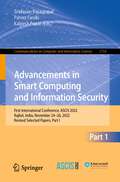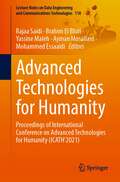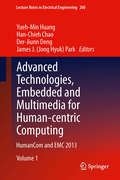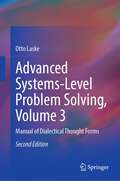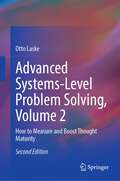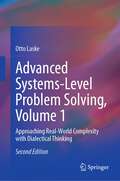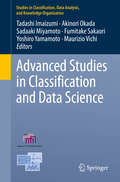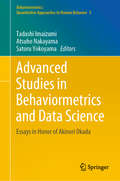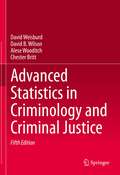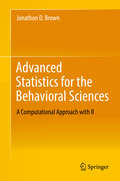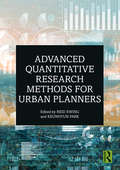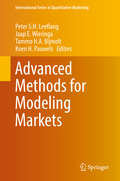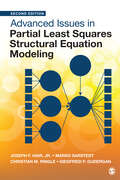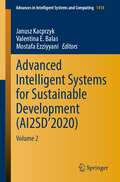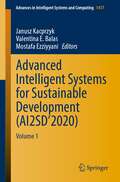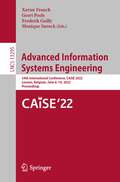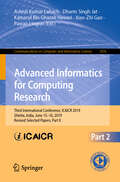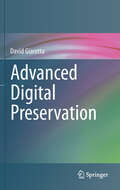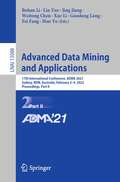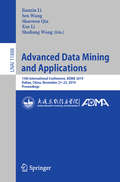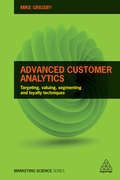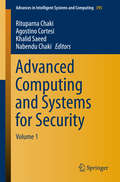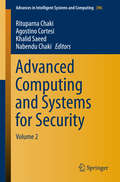- Table View
- List View
Advancements in Smart Computing and Information Security: First International Conference, ASCIS 2022, Rajkot, India, November 24–26, 2022, Revised Selected Papers, Part I (Communications in Computer and Information Science #1759)
by Sridaran Rajagopal Parvez Faruki Kalpesh PopatThis two-volume constitutes the refereed proceedings of the First International Conference on Advancements in Smart Computing and Information Security, ASCIS 2022, held in Rajkot, India, in November 2022. The 37 full papers and 18 short papers presented were thoroughly reviewed and selected from the 206 submissions. The papers are organized in topical sections on artificial intelligence; smart computing; cyber security; industry.
Advanced Technologies for Humanity: Proceedings of International Conference on Advanced Technologies for Humanity (ICATH'2021) (Lecture Notes on Data Engineering and Communications Technologies #110)
by Mohammed Essaaidi Yassine Maleh Rajaa Saidi Brahim El Bhiri Ayman MosallamThis book gathers the proceedings of the International Conference on Advanced Technologies for Humanity (ICATH’2021), held on November 26-27, 2021, in INSEA, Rabat, Morocco. ICATH’2021 was jointly co-organized by the National Institute of Statistics and Applied Economics (INSEA) in collaboration with the Moroccan School of Engineering Sciences (EMSI), the Hassan II Institute of Agronomy and Veterinary Medicine (IAV-Hassan II), the National Institute of Posts and Telecommunications (INPT), the National School of Mineral Industry (ENSMR), the Faculty of Sciences of Rabat (UM5-FSR), the National School of Applied Sciences of Kenitra (ENSAK) and the Future University in Egypt (FUE).ICATH’2021 was devoted to practical models and industrial applications related to advanced technologies for Humanity. It was considered as a meeting point for researchers and practitioners to enable the implementation of advanced information technologies into various industries. This book is helpful for PhD students as well as researchers.The 48 full papers were carefully reviewed and selected from 105 submissions. The papers presented in the volume are organized in topical sections on synergies between (i) smart and sustainable cities, (ii) communication systems, signal and image processing for humanity, (iii) cybersecurity, database and language processing for human applications, (iV) renewable and sustainable energies, (V) civil engineering and structures for sustainable constructions, (Vi) materials and smart buildings and (Vii) Industry 4.0 for smart factories.All contributions were subject to a double-blind review. The review process was highly competitive. We had to review 105 submissions from 12 countries. A team of over 100 program committee members and reviewers did this terrific job. Our special thanks go to all of them.
Advanced Technologies, Embedded and Multimedia for Human-centric Computing: HumanCom and EMC 2013 (Lecture Notes in Electrical Engineering #260)
by James J. Jong Hyuk Park Han-Chieh Chao Yueh-Min Huang Der-Jiunn DengThe theme of HumanCom and EMC is focused on the various aspects of human-centric computing for advances in computer science and its applications, embedded and multimedia computing and provides an opportunity for academic and industry professionals to discuss the latest issues and progress in the area of human-centric computing. And the theme of EMC (Advanced in Embedded and Multimedia Computing) is focused on the various aspects of embedded system, smart grid, cloud and multimedia computing, and it provides an opportunity for academic, industry professionals to discuss the latest issues and progress in the area of embedded and multimedia computing. Therefore this book will be include the various theories and practical applications in human-centric computing and embedded and multimedia computing.
Advanced Systems-Level Problem Solving, Volume 3: Manual of Dialectical Thought Forms
by Otto LaskeThis three-volume set introduces the practice of advanced, ‘dialectical’ systems-level problem solving in both the social and natural sciences. In social science, it opens new vistas regarding organizational, strategy, and work design. In the natural sciences, it provides heretofore missing conceptions of physical systems in peril due to the climate crisis. In addition, the author draws conclusions that are important for advancing generative AI. The monograph presents novel conceptual tools that directly impact the internal structure of a systems analyst’s mental processing in real time. While the first volume lays the theoretical groundwork for dialectical systems analysis, the second, focusing on the nature of work, lays bare the structure of complex thinking in terms of the ‘thought forms’ it requires. In order to facilitate better understanding of the principles taught in the first two volumes, the third volume provides a Manual of Dialectical Thought Forms, which is the only one in existence today.
Advanced Systems-Level Problem Solving, Volume 2: How to Measure and Boost Thought Maturity
by Otto LaskeThis three-volume set introduces the practice of advanced, ‘dialectical’ systems-level problem solving in both the social and natural sciences. In social science, it opens new vistas regarding organizational, strategy, and work design. In the natural sciences, it provides heretofore missing conceptions of physical systems in peril due to the climate crisis. In addition, the author draws conclusions that are important for advancing generative AI. The monograph presents novel conceptual tools that directly impact the internal structure of a systems analyst’s mental processing in real time. While the first volume lays the theoretical groundwork for dialectical systems analysis, the second, focusing on the nature of work, lays bare the structure of complex thinking in terms of the ‘thought forms’ it requires. In order to facilitate better understanding of the principles taught in the first two volumes, the third volume provides a Manual of Dialectical Thought Forms, which is the only one in existence today.
Advanced Systems-Level Problem Solving, Volume 1: Approaching Real-World Complexity with Dialectical Thinking
by Otto LaskeThis three-volume set introduces the practice of advanced, ‘dialectical’ systems-level problem solving in both the social and natural sciences. In social science, it opens new vistas regarding organizational, strategy, and work design. In the natural sciences, it provides heretofore missing conceptions of physical systems in peril due to the climate crisis. In addition, the author draws conclusions that are important for advancing generative AI. The monograph presents novel conceptual tools that directly impact the internal structure of a systems analyst’s mental processing in real time. While the first volume lays the theoretical groundwork for dialectical systems analysis, the second, focusing on the nature of work, lays bare the structure of complex thinking in terms of the ‘thought forms’ it requires. In order to facilitate better understanding of the principles taught in the first two volumes, the third volume provides a Manual of Dialectical Thought Forms, which is the only one in existence today.
Advanced Studies in Classification and Data Science: Proceedings Of The 6th Conference Of The International Federation Of Classification Societies (ifcs-98) Università La Sapienza , Rome, 21-24 July 1998 (Studies in Classification, Data Analysis, and Knowledge Organization)
by Tadashi Imaizumi Akinori Okada Sadaaki Miyamoto Fumitake Sakaori Yoshiro Yamamoto Maurizio VichiThis edited volume focuses on the latest developments in classification and data science and covers a wide range of topics in the context of data analysis and related areas, e.g. the analysis of complex data, analysis of qualitative data, methods for high-dimensional data, dimensionality reduction, data visualization, multivariate statistical methods, and various applications to real data in the social sciences, medical sciences, and other disciplines. In addition to sharing theoretical and methodological findings, the book shows how to apply the proposed methods to a variety of problems — e.g. in consumer behavior, decision-making, marketing data and social network structures. Both methodological aspects and applications to a wide range of areas such as economics, behavioral science, marketing science, management science and the social sciences are covered. The book is chiefly intended for researchers and practitioners who are interested in the latest developments and practical applications in these fields, as well as applied statisticians and data analysts. Its combination of methodological advances with a wide range of real-world applications gathered from several fields makes it of unique value in helping readers solve their research problems.
Advanced Studies in Behaviormetrics and Data Science: Essays in Honor of Akinori Okada (Behaviormetrics: Quantitative Approaches to Human Behavior #5)
by Tadashi Imaizumi Atsuho Nakayama Satoru YokoyamaThis book focuses on the latest developments in behaviormetrics and data science, covering a wide range of topics in data analysis and related areas of data science, including analysis of complex data, analysis of qualitative data, methods for high-dimensional data, dimensionality reduction, visualization of such data, multivariate statistical methods, analysis of asymmetric relational data, and various applications to real data. In addition to theoretical and methodological results, it also shows how to apply the proposed methods to a variety of problems, for example in consumer behavior, decision making, marketing data, and social network structures.Moreover, it discuses methodological aspects and applications in a wide range of areas, such as behaviormetrics; behavioral science; psychology; and marketing, management and social sciences. Combining methodological advances with real-world applications collected from a variety of research fields, the book is a valuable resource for researchers and practitioners, as well as for applied statisticians and data analysts.
Advanced Statistics in Criminology and Criminal Justice
by David Weisburd David B. Wilson Alese Wooditch Chester BrittThis book provides the student, researcher or practitioner with the tools to understand many of the most commonly used advanced statistical analysis tools in criminology and criminal justice, and also to apply them to research problems. The volume is structured around two main topics, giving the user flexibility to find what they need quickly. The first is “the general linear model” which is the main analytic approach used to understand what influences outcomes in crime and justice. It presents a series of approaches from OLS multivariate regression, through logistic regression and multi-nomial regression, hierarchical regression, to count regression. The volume also examines alternative methods for estimating unbiased outcomes that are becoming more common in criminology and criminal justice, including analyses of randomized experiments and propensity score matching. It also examines the problem of statistical power, and how it can be used to better design studies. Finally, it discusses meta analysis, which is used to summarize studies; and geographic statistical analysis, which allows us to take into account the ways in which geographies may influence our statistical conclusions.
Advanced Statistics for the Behavioral Sciences: A Computational Approach with R
by Jonathon D. BrownThis book demonstrates the importance of computer-generated statistical analyses in behavioral science research, particularly those using the R software environment. Statistical methods are being increasingly developed and refined by computer scientists, with expertise in writing efficient and elegant computer code. Unfortunately, many researchers lack this programming background, leaving them to accept on faith the black-box output that emerges from the sophisticated statistical models they frequently use. Building on the author’s previous volume, Linear Models in Matrix Form, this text bridges the gap between computer science and research application, providing easy-to-follow computer code for many statistical analyses using the R software environment. The text opens with a foundational section on linear algebra, then covers a variety of advanced topics, including robust regression, model selection based on bias and efficiency, nonlinear models and optimization routines, generalized linear models, and survival and time-series analysis. Each section concludes with a presentation of the computer code used to illuminate the analysis, as well as pointers to packages in R that can be used for similar analyses and nonstandard cases. The accessible code and breadth of topics make this book an ideal tool for graduate students or researchers in the behavioral sciences who are interested in performing advanced statistical analyses without having a sophisticated background in computer science and mathematics.
Advanced Quantitative Research Methods for Urban Planners
by Reid Ewing Keunhyun ParkAdvanced Quantitative Research Methods for Urban Planners provides fundamental knowledge and hands-on techniques about research, such as research topics and key journals in the planning field, advice for technical writing, and advanced quantitative methodologies. This book aims to provide the reader with a comprehensive and detailed understanding of advanced quantitative methods and to provide guidance on technical writing. Complex material is presented in the simplest and clearest way possible using real-world planning examples and making the theoretical content of each chapter as tangible as possible. Hands-on techniques for a variety of quantitative research studies are covered to provide graduate students, university faculty, and professional researchers with useful guidance and references. A companion to Basic Quantitative Research Methods for Urban Planners, Advanced Quantitative Research Methods for Urban Planners is an ideal read for researchers who want to branch out methodologically and for practicing planners who need to conduct advanced analyses with planning data.
Advanced Methods for Modeling Markets (International Series in Quantitative Marketing)
by Peter S. H. Leeflang Jaap E. Wieringa Koen H. Pauwels Tammo H.A BijmoltThis volume presents advanced techniques to modeling markets, with a wide spectrum of topics, including advanced individual demand models, time series analysis, state space models, spatial models, structural models, mediation, models that specify competition and diffusion models. It is intended as a follow-on and companion to Modeling Markets (2015), in which the authors presented the basics of modeling markets along the classical steps of the model building process: specification, data collection, estimation, validation and implementation. This volume builds on the concepts presented in Modeling Markets with an emphasis on advanced methods that are used to specify, estimate and validate marketing models, including structural equation models, partial least squares, mixture models, and hidden Markov models, as well as generalized methods of moments, Bayesian analysis, non/semi-parametric estimation and endogeneity issues. Specific attention is given to big data. The market environment is changing rapidly and constantly. Models that provide information about the sensitivity of market behavior to marketing activities such as advertising, pricing, promotions and distribution are now routinely used by managers for the identification of changes in marketing programs that can improve brand performance. In today's environment of information overload, the challenge is to make sense of the data that is being provided globally, in real time, from thousands of sources. Although marketing models are now widely accepted, the quality of the marketing decisions is critically dependent upon the quality of the models on which those decisions are based. This volume provides an authoritative and comprehensive review, with each chapter including: #65533; an introduction to the method/methodology #65533; a numerical example/application in marketing #65533; references to other marketing applications #65533; suggestions about software. Featuring contributions from top authors in the field, this volume will explore current and future aspects of modeling markets, providing relevant and timely research and techniques to scientists, researchers, students, academics and practitioners in marketing, management and economics.
Advanced Issues in Partial Least Squares Structural Equation Modeling
by Joe Hair Marko Sarstedt Christian M. Ringle Siegfried P. GuderganThe Second Edition of Advanced Issues in Partial Least Squares Structural Equation Modeling offers a straightforward and practical guide to PLS-SEM for users ready to go further than the basics of A Primer on Partial Least Squares Structural Equation Modeling, Third Edition. Even in this advanced guide, the authors have limited the emphasis on equations, formulas, and Greek symbols, and instead rely on detailed explanations of the fundamentals of PLS-SEM and provide general guidelines for understanding and evaluating the results of applying the method. A single study on corporate reputation features as an example throughout the book, along with a single software package (SmartPLS 4.0) to provide a seamless learning experience. The approach of this book is based on the authors’ many years of conducting research and teaching methodology courses, including developing the SmartPLS software. The preparation of the book, especially this new edition, is based on the authors’ desire to communicate the PLS-SEM method to a much broader audience from management and marketing to engineering, geography, medicine, political and environmental sciences, psychology, and beyond. The Second Edition includes a new chapter on the necessary condition analysis (NCA) and covers the most recent developments in PLS-SEM, with detailed guidelines for estimating and validating higher-order constructs and nonlinear effects as well as more insights on multigroup and latent class analyses using FIMIX-PLS and PLS-POS. The book is aimed at researchers and practitioners who seek to gain comprehensive knowledge of more advanced PLS-SEM methods.
Advanced Issues in Partial Least Squares Structural Equation Modeling
by Joe Hair Marko Sarstedt Christian M. Ringle Siegfried P. GuderganThe Second Edition of Advanced Issues in Partial Least Squares Structural Equation Modeling offers a straightforward and practical guide to PLS-SEM for users ready to go further than the basics of A Primer on Partial Least Squares Structural Equation Modeling, Third Edition. Even in this advanced guide, the authors have limited the emphasis on equations, formulas, and Greek symbols, and instead rely on detailed explanations of the fundamentals of PLS-SEM and provide general guidelines for understanding and evaluating the results of applying the method. A single study on corporate reputation features as an example throughout the book, along with a single software package (SmartPLS 4.0) to provide a seamless learning experience. The approach of this book is based on the authors’ many years of conducting research and teaching methodology courses, including developing the SmartPLS software. The preparation of the book, especially this new edition, is based on the authors’ desire to communicate the PLS-SEM method to a much broader audience from management and marketing to engineering, geography, medicine, political and environmental sciences, psychology, and beyond. The Second Edition includes a new chapter on the necessary condition analysis (NCA) and covers the most recent developments in PLS-SEM, with detailed guidelines for estimating and validating higher-order constructs and nonlinear effects as well as more insights on multigroup and latent class analyses using FIMIX-PLS and PLS-POS. The book is aimed at researchers and practitioners who seek to gain comprehensive knowledge of more advanced PLS-SEM methods.
Advanced Intelligent Systems for Sustainable Development: Volume 2 (Advances in Intelligent Systems and Computing #1418)
by Janusz Kacprzyk Mostafa Ezziyyani Valentina E. BalasThis book publishes the best papers accepted and presented at the 3rd edition of the International Conference on Advanced Intelligent Systems for Sustainable Development Applied to Agriculture, Energy, Health, Environment, Industry, Education, Economy, and Security (AI2SD’2020). This conference is one of the biggest amalgamations of eminent researchers, students, and delegates from both academia and industry where the collaborators have an interactive access to emerging technology and approaches globally. In this book, readers find the latest ideas addressing technological issues relevant to all areas of the social and human sciences for sustainable development. Due to the nature of the conference with its focus on innovative ideas and developments, the book provides the ideal scientific and brings together very high-quality chapters written by eminent researchers from different disciplines, to discover the most recent developments in scientific research.
Advanced Intelligent Systems for Sustainable Development: Volume 1 (Advances in Intelligent Systems and Computing #1417)
by Janusz Kacprzyk Mostafa Ezziyyani Valentina E. BalasThis book publishes the best papers accepted and presented at the 3rd edition of the International Conference on Advanced Intelligent Systems for Sustainable Development Applied to Agriculture, Energy, Health, Environment, Industry, Education, Economy, and Security (AI2SD’2020). This conference is one of the biggest amalgamations of eminent researchers, students, and delegates from both academia and industry where the collaborators have an interactive access to emerging technology and approaches globally. In this book, readers find the latest ideas addressing technological issues relevant to all areas of the social and human sciences for sustainable development. Due to the nature of the conference with its focus on innovative ideas and developments, the book provides the ideal scientific and brings together very high-quality chapters written by eminent researchers from different disciplines, to discover the most recent developments in scientific research.
Advanced Information Systems Engineering: 34th International Conference, CAiSE 2022, Leuven, Belgium, June 6–10, 2022, Proceedings (Lecture Notes in Computer Science #13295)
by Xavier Franch Geert Poels Frederik Gailly Monique SnoeckThis book constitutes the refereed proceedings of the 34th International Conference on Advanced Information Systems Engineering, CAiSE 2022, which was held in Leuven, Belgium, during June 6-10, 2022.The 31 full papers included in these proceedings were selected from 203 submissions. They were organized in topical sections as follows: Process mining; sustainable and explainable applications; tools and methods to support research and design; process modeling; natural language processing techniques in IS engineering; process monitoring and simulation; graph and network models; model analysis and comprehension; recommender systems; conceptual models, metamodels and taxonomies; and services engineering and digitalization.
Advanced Information Systems Engineering: 35th International Conference, CAiSE 2023, Zaragoza, Spain, June 12–16, 2023, Proceedings (Lecture Notes in Computer Science #13901)
by Marta Indulska Iris Reinhartz-Berger Carlos Cetina Oscar PastorThis book constitutes the proceedings of the 35th International Conference on Advanced Information Systems Engineering, CAiSE 2023, which was held in Zaragoza, Spain, during June 12-16, 2023. The 36 full papers included in these proceedings were selected from 161 submissions. They were organized in topical sections as follows: Cyber-human and cyber-physical systems; requirements engineering; IoT; environmental applications; process mining; event-driven process mining; ontology and knowledge representation; model-driven approaches; process monitoring; conformance, compliance and workarounds; data-centric approaches; privacy and security; explainable AI; service-related approaches.
Advanced Informatics for Computing Research: Third International Conference, ICAICR 2019, Shimla, India, June 15–16, 2019, Revised Selected Papers, Part II (Communications in Computer and Information Science #1076)
by Ashish Kumar Luhach Dharm Singh Jat Kamarul Bin Ghazali Hawari Xiao-Zhi Gao Pawan LingrasThis two-volume set (CCIS 1075 and CCIS 1076) constitutes the refereed proceedings of the Third International Conference on Advanced Informatics for Computing Research, ICAICR 2019, held in Shimla, India, in June 2019. The 78 revised full papers presented were carefully reviewed and selected from 382 submissions. The papers are organized in topical sections on computing methodologies; hardware; information systems; networks; software and its engineering.
Advanced Digital Preservation
by David GiarettaThere is growing recognition of the need to address the fragility of digital information, on which our society heavily depends for smooth operation in all aspects of daily life. This has been discussed in many books and articles on digital preservation, so why is there a need for yet one more? Because, for the most part, those other publications focus on documents, images and webpages - objects that are normally rendered to be simply displayed by software to a human viewer. Yet there are clearly many more types of digital objects that may need to be preserved, such as databases, scientific data and software itself. David Giaretta, Director of the Alliance for Permanent Access, and his contributors explain why the tools and techniques used for preserving rendered objects are inadequate for all these other types of digital objects, and they provide the concepts, techniques and tools that are needed. The book is structured in three parts. The first part is on theory, i.e., the concepts and techniques that are essential for preserving digitally encoded information. The second part then shows practice, i.e., the use and validation of these tools and techniques. Finally, the third part concludes by addressing how to judge whether money is being well spent, in terms of effectiveness and cost sharing. Various examples of digital objects from many sources are used to explain the tools and techniques presented. The presentation style mainly aims at practitioners in libraries, archives and industry who are either directly responsible for preservation or who need to prepare for audits of their archives. Researchers in digital preservation and developers of preservation tools and techniques will also find valuable practical information here. Researchers creating digitally encoded information of all kinds will also need to be aware of these topics so that they can help to ensure that their data is usable and can be valued by others now and in the future. To further assist the reader, the book is supported by many hours of videos and presentations from the CASPAR project and by a set of open source software.
Advanced Data Mining and Applications: 17th International Conference, ADMA 2021, Sydney, NSW, Australia, February 2–4, 2022, Proceedings, Part II (Lecture Notes in Computer Science #13088)
by Bohan Li Lin Yue Jing Jiang Weitong Chen Xue Li Guodong Long Fei Fang Han YuThis book constitutes the proceedings of the 17th International Conference on Advanced Data Mining and Applications, ADMA 2021, held in Sydney, Australia in February 2022.*The 26 full papers presented together with 35 short papers were carefully reviewed and selected from 116 submissions. The papers were organized in topical sections in Part II named: Pattern mining; Graph mining; Text mining; Multimedia and time series data mining; and Classification, clustering and recommendation. * The conference was originally planned for December 2021, but was postponed to 2022.
Advanced Data Mining and Applications: 15th International Conference, ADMA 2019, Dalian, China, November 21–23, 2019, Proceedings (Lecture Notes in Computer Science #11888)
by Shuliang Wang Xue Li Jianxin Li Sen Wang Shaowen QinThis book constitutes the proceedings of the 15th International Conference on Advanced Data Mining and Applications, ADMA 2019, held in Dalian, China in November 2019. The 39 full papers presented together with 26 short papers and 2 demo papers were carefully reviewed and selected from 170 submissions. The papers were organized in topical sections named: Data Mining Foundations; Classification and Clustering Methods; Recommender Systems; Social Network and Social Media; Behavior Modeling and User Profiling; Text and Multimedia Mining; Spatial-Temporal Data; Medical and Healthcare Data/Decision Analytics; and Other Applications.
Advanced Customer Analytics
by Mike GrigsbyAdvanced Customer Analytics provides a clear guide to the specific analytical challenges faced by the retail sector. The book covers the nature and scale of data obtained in transactions, relative proximity to the consumer and the need to monitor customer behaviour across multiple channels. The book advocates a category management approach, taking into account the need to understand the consumer mindset through elasticity modelling and discount strategies, as well as targeted marketing and loyalty design. A practical, no-nonsense approach to complex scenarios is taken throughout, breaking down tasks into easily digestible steps. The use of a fictional retail analyst 'Scott' helps to provide accessible examples of practice. Advanced Customer Analytics does not skirt around the complexities of this subject but offers conceptual support to steer retail marketers towards making the right choices for analysing their data.
Advanced Computing and Systems for Security: Volume 1 (Advances in Intelligent Systems and Computing #395)
by Khalid Saeed Nabendu Chaki Agostino Cortesi Rituparna ChakiThe book contains the extended version of the works that have been presented and discussed in the Second International Doctoral Symposium on Applied Computation and Security Systems (ACSS 2015) held during May 23-25, 2015 in Kolkata, India. The symposium has been jointly organized by the AGH University of Science & Technology, Cracow, Poland; Ca' Foscari University, Venice, Italy and University of Calcutta, India. The book is divided into volumes and presents dissertation works in the areas of Image Processing, Biometrics-based Authentication, Soft Computing, Data Mining, Next Generation Networking and Network Security, Remote Healthcare, Communications, Embedded Systems, Software Engineering and Service Engineering.
Advanced Computing and Systems for Security: Volume 2 (Advances in Intelligent Systems and Computing #396)
by Khalid Saeed Nabendu Chaki Agostino Cortesi Rituparna ChakiThe book contains the extended version of the works that have been presented and discussed in the Second International Doctoral Symposium on Applied Computation and Security Systems (ACSS 2015) held during May 23-25, 2015 in Kolkata, India. The symposium has been jointly organized by the AGH University of Science & Technology, Cracow, Poland; Ca' Foscari University, Venice, Italy and University of Calcutta, India. The book is divided into volumes and presents dissertation works in the areas of Image Processing, Biometrics-based Authentication, Soft Computing, Data Mining, Next Generation Networking and Network Security, Remote Healthcare, Communications, Embedded Systems, Software Engineering and Service Engineering.
